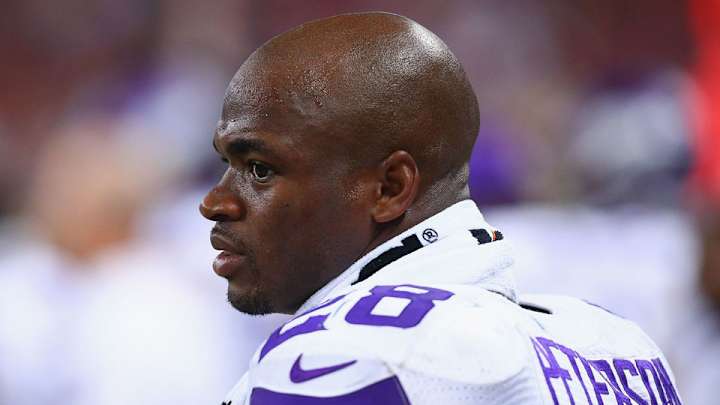Due Process and Double Standards

EDEN PRAIRIE, Minn. – When Vikings general manager Rick Spielman took the podium Monday following a weekend in which former NFL MVP Adrian Peterson was deactivated then reinstated as starting running back, he began by reading a statement, no doubt vetted by the suits looking on from the back of the room. “We must defer to the legal system to determine whether he went too far,” Spielman said of Peterson, who was indicted in Texas last week for whipping his child with a tree branch, “but we cannot make that judgment.”
Then came the first question.
What message are you sending to victims of abuse?
Said Spielman: “We feel strongly as an organization that [Peterson's behavior] is disciplining a child.” The choice to reinstate the running back, added the general manager, "has nothing to do with him as a football player.”
Spielman brought up due process, discussions with Peterson's attorneys and the Vikings' attempts to "gather all the information we can." It all appeared part of a larger effort to give Adrian Peterson every benefit of the doubt.
Why? How could the Vikings be so adamant about protecting the man who admittedly whipped his 4-year-old son with a tree branch and left cuts that were visible days later—wounds determined by a doctor and a grand jury to constitute evidence of abuse?
Chris Cook might be asking that very question. In 2011, when Spielman was vice president of player personnel, the Vikings under team owner Zygi Wilf suspended Cook after the cornerback was charged with felony domestic assault. Cook was reinstated a few weeks later but was told to stay away from the team until the legal process played out. Cook missed 10 games that season. He was later acquitted of all charges.
Should We Still Love Football?
Peter King asks the question in this week Monday Morning Quarterback. FULL STORY Readers respond in the Tuesday Mailbag. FULL STORY
As Spielman gained influence and rank, the Vikings' willingness to part ways with offenders before the completion of due process became a de facto policy. The team cut Caleb King in 2012 after an arrest for assault; in 2013 it released A.J. Jefferson hours after his arrest for alleged domestic violence; and this winter Minnesota cut linebacker Erin Henderson following a DUI arrest.
Cook, King, Jefferson and Henderson made it easy for the Vikings to cast them away. They weren’t stud performers, and they hadn’t won over the locker room; at least, not like Peterson.
Exhibit A: What little that was heard Sunday and Monday around the team came from a handful of players defending the running back. Most other players remained silent.
* * *
That Peterson is a great teammate is undisputed, but the team reaction to this latest allegation against an NFL player is in some ways split according to childhood experience. Some players who were inclined to speak to the media defended what Peterson termed “disciplining” his son. Said fullback Jerome Felton: “I’m from the south, so I probably got it a little worse than that growing up. I’ve had it a couple times. My mother cared about me a lot, and I knew people who didn’t have parents who cared and didn’t discipline them and turned out a lot different than I did.”
Most players, though, declined to comment Sunday after a loss to the Patriots and weren’t available Monday in a sparsely-attended open locker room session. Of those who were willing to talk, the number of players who spoke candidly were outnumbered by those who professed to mind their business and who said they hadn’t even seen the pictures of Peterson’s bloodied son.
No one is talking about it,” one Vikings player said. “Everyone is quiet on this one.
"You don’t want to see anything like that, especially with the type of guy he is," said second-year linebacker Gerald Hodges, who says Peterson often sneaks brand-new cleats into his locker upon request. "I didn’t believe anything until it was addressed by our coach. I didn’t see the pictures; you just hear people talking about it. You let him handle his own situation."
Hodges wasn’t alone. “Honestly,” another player told me, “no one is talking about it. We usually talk about everything in this room, but everyone is quiet on this one.”
Turning a blind eye and a deaf ear is becoming the theme of this hell month for the NFL.
Last week it took video of Ravens running back Ray Rice striking his fiancée to emerge for the team and the league to act. Until then players defended Rice, even with the existence of video depicting the aftermath of the incident, Rice dragging Janay Palmer's unconscious body out of an elevator. After the release, Ravens players reportedly felt they'd been lied to about the events of that night by the running back, and told Bleacher Report's Mike Freeman as much. Only then did they turn.
For NFL players to behave this way, with an unwavering support of a teammate against all but the most damning evidence imaginable, is understandable.
But we’re supposed to hold the commissioner of the NFL and its team owners, general managers and coaches to a higher standard. At least, that’s what Roger Goodell told us. Yet we’re watching them operate like teammates, not like bosses—shielding their eyes and ears from the graphic details and hiding behind due process in a case in which all the facts are on the table.
It only affirms what we've come to learn these past several days about some of the men who run the NFL: Decency is only a matter of convenience.
